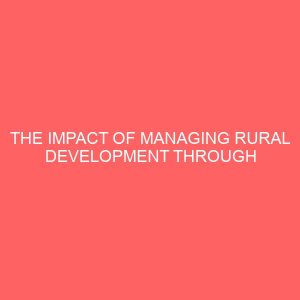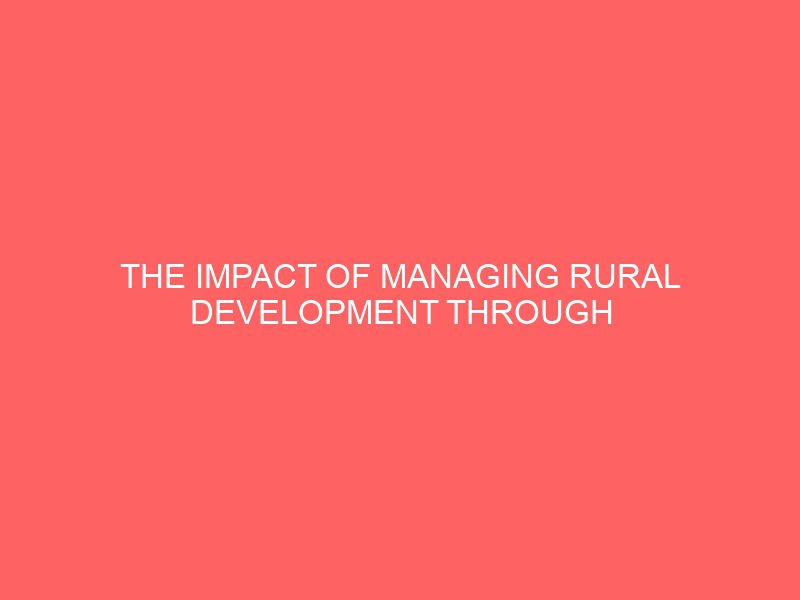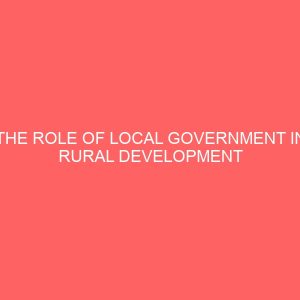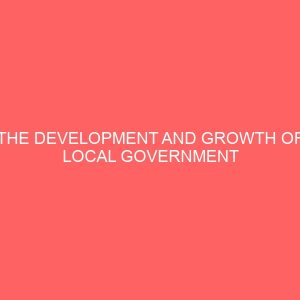Description
CHAPTER ONE
1.1 BACKGROUND OF THE STUDY
In 1976 a uniform system of local government was introduced according to local government reforms of 1976 the primary motive is to take development direct from the center to the people at the rural areas through the local government hence the same reform 1976:1 describes local government as a tool for rural development some of these motive are the conscious attempt of the federal government to involve people in the management of their rural affairs through which the human and materials resources of the rural dwellers can be effectively mobilized tapped and into industrialization process.
Since Nigerian started existing as a nation development has been taking place especially in the urban area for the fact that man often craves for what is good it is often that people usually mesh to urban areas where there are provision for the comfort and welfare of man by way social amenities and the infrastructure provision this exodus of people is necessitated by the fact that rural area are often neglected on term of development but those who rush to develop urban areas seen to have forgotten that there every needs to develop the rural are because they are bases the beginning and also terminate destination Odenigwe 1879:4 postulated that the rural subsection of the economy is endeavored with abundant natural resource unharnessed for this to be harnessed would require integrating rural people in he rural development excise through the provision of small scale industries of different types, he defines industrialization as an integrated process of developing industries that would extract manufacture or convert raw materials into finished goods and services industries that means different things to different people and circumstances.
Spie 1968 stated that industrialization embraces the means by which man control or modifies his natural environment it is that great growing engine of charge industrializing is the major means of people adjusting to environment. It has to do it the techniques and tools with which people utilize the materials resources of their environment to satisfy their various needs and desires, industrialization is of course an application of practical or mechanical science to industries or commerce it is a technical know how scientific idea information body of knowledge materials or goods and services capable of being systematic and sequential in the generation communicable and adoptable to application in a given economic political social and cultural money against this background we conclude that industrialization embraces a body of organized knowledge tools and machine used by man to manipulate his environment to satisfy his needs it is no this platform that the subject matter managing rural development through industrialization was drawn.
In managing rural development the basic role of management is to plan organize direct and control it is our collective views that managers lead other than plan man power rather than direct pattern rather than organize and assess rather than control the effectiveness of management arises from leadership effort towards the simultaneous creation of a cooperative and learning organization to facilitate the implementation process of management practices which when implemented support rural and national development organization survival and effective authorization of resource for the benefit of mankind.
TABLE OF CONTENTS
Title page
Certificate
Dedication
Acknowledgement
Abstract
CHAPTER ONE
1.1 Background of the study
1.2 Statement of the problems
1.3 Objective of the study
1.4 Research question
1.5 Significance of the study
1.6 Scope of the study
1.7 Limitation of the study
CHAPTER TWO
Review of related literature
2.1 Historical background of Awgu L.G.A
2.2 Industrialization in Awgu Local government
2.3 Advantages of industrialization
2.4 Problems associated with industrialization in the rural area
2.5 Managing rural industrialization
CHAPTER THREE
3.1 Source of data
3.2 Population of the study
3.3 Determination of the samples size
3.4 Sample technique
3.5 Section and construction of instrument
3.6 Administration of research instrument
3.7 Instrument
CHAPTER FOUR
Presentation of data
Analysis of data
CHAPTER FIVE
5.1 Summary of finding
5.2 Recommendation
5.3 Conclusion








Reviews
There are no reviews yet.